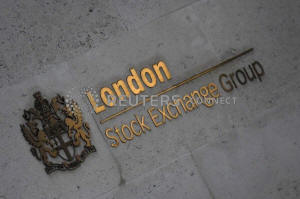|
Stocks bask in trade optimism, set for
fourth straight week of gains
 Send a link to a friend
Send a link to a friend
 [January 18, 2019]
By Ritvik Carvalho [January 18, 2019]
By Ritvik Carvalho
LONDON (Reuters) - Global stocks jumped to
their highest in more than a month on Friday after a report suggested
progress toward resolving the trade dispute between the United States
and China.
E-mini futures for the S&P 500 index were up about 0.2 percent and Dow
futures were up about 0.3 percent, indicating a higher open on Wall
Street.
European stocks surged to their highest since early December, with the
pan-European STOXX 600 <.STOXX> index up over 1 percent by afternoon
trade in London.
Trade-exposed indexes and stocks gained the most, with autos <.SXAP>
rising nearly 2 percent and Germany's exporter-heavy DAX <.GDAXI> up 1.5
percent.
The gains followed the lead of stocks in Asia overnight, which in turn
took their cue from Wall Street's performance on Thursday.
The Wall Street Journal reported on Thursday that U.S. Treasury
Secretary Steven Mnuchin discussed lifting some or all tariffs imposed
on Chinese imports and suggested offering a tariff rollback during trade
discussions scheduled for Jan. 30.

U.S. stocks rallied on the report but pared some of the gains after the
Treasury denied Mnuchin had made any such recommendation. The Journal
also reported that U.S. Trade Representative Robert Lighthizer resisted
Mnuchin's idea.
"Even though the Treasury quickly denied the report, markets didn't
retrace much, which implies that traders believe the news are credible –
or at least that the overall negotiating process is moving in the right
direction," said Marios Hadjikyriacos, investment analyst at online
broker XM.
MSCI's broadest index of Asia-Pacific shares outside Japan
<.MIAPJ0000PUS> added 0.75 percent. The index has gained 1.5 percent
this week. The Shanghai Composite Index <.SSEC> was up 1.4 percent.
Australian stocks <.AXJO> rose half a percent, South Korea's KOSPI
<.KS11> advanced 0.8 percent and Japan's Nikkei <.N225> gained more than
1 percent to a one-month high.
The gains across regions helped lift the MSCI All-Country World Index to
its highest in more than a month <.MIWD00000PUS>. The index, which
tracks stocks across 47 countries, was set for its fourth straight
weekly gain, its longest weekly winning streak in six months. It was
last up almost half a percent.
Chinese Vice Premier Liu He will visit the United States on Jan. 30 and
31 for the latest round of trade talks aimed at resolving the dispute
between the world's two largest economies.
[to top of second column]
|

The London Stock Exchange Group offices are seen in the City of
London, Britain, December 29, 2017. REUTERS/Toby Melville

Indicators released recently showed signs that the Chinese economy is
losing momentum.
A report due on Monday is expected to show China's fourth-quarter
economic growth slowed to its weakest since the global financial crisis,
according to a Reuters poll, as demand faltered at home and abroad.
Against a basket of currencies, the dollar was set for its first weekly
rise in five, though it was flat on the day.
The euro rose 0.1 percent to $1.14040 <EUR=>. It was on track for a
weekly loss of 0.7 percent.
The 10-year Treasury yield <US10YT=RR> stood at 2.7716 percent, its
highest in three weeks.
The pound was 0.4 percent lower at $1.2932 <GBP=D3>, after climbing to a
two-month peak of $1.3001 on hopes that Britain can avoid a no-deal
Brexit.
British retail sales fell for the first time since March during the
three months to December, confirming a slowdown in consumer spending as
Brexit draws near.
Prime Minister Theresa May survived a vote of confidence this week,
removing some political uncertainty for now. The longer-term prospects
for Britain and its markets remained far from clear, though.
U.S. crude oil futures <CLc1> extended Thursday's gains, adding 1.5
percent to $52.84 per barrel. Brent crude <LCOc1> was up 1.3 percent at
$61.99 per barrel and on track to gain roughly 2 percent on the week.
Elsewhere in commodities, palladium <XPD=> was 1.2 percent higher at
$1,412.50 an ounce after rising to an all-time high of $1,434.50
overnight.

Demand has recently outstripped supply for the metal, used in
emissions-reducing catalytic converters for cars. Palladium also
appeared to get a boost from hopes for further government stimulus in
China, the world's biggest auto market.
Spot gold <XAU=> was down half a percent at $1,285.03 an ounce, after
relinquishing its spot as the most expensive precious metal to palladium
early in December.
(Reporting by Ritvik Carvalho, additional reporting by Shinichi Saoshiro
in Tokyo; editing by Larry King and Raissa Kasolowsky)
[© 2019 Thomson Reuters. All rights
reserved.]
Copyright 2019 Reuters. All rights reserved. This material may not be published,
broadcast, rewritten or redistributed.
Thompson Reuters is solely responsible for this content. |